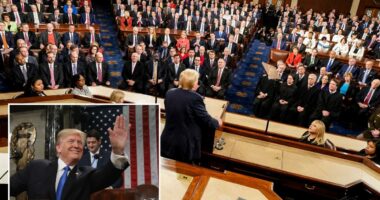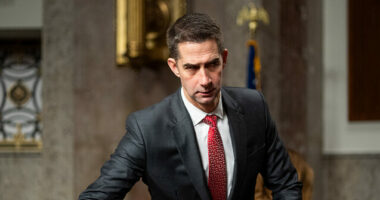Share this @internewscast.com

Federal Reserve Chair Jerome Powell faces allegations of dishonest testimony to Congress regarding a $2.5 billion overhaul of the central bank’s headquarters in Washington, with critics calling for repercussions, as uncovered by The Post.
During a Senate Banking Committee session last week, Powell dismissed The Post’s exclusive April report on the costly renovation—which Senator Tim Scott (R-SC) compared to the “Palace of Versailles”—as “misleading and inaccurate.”
Powell firmly stated to the committee on Wednesday, “There is no VIP dining area, no new marble installations. We are not adding special elevators, water features, beehives, or roof terrace gardens.”
But Powell — who is meanwhile facing heat from President Trump over a failure to slash interest rates — directly contradicted the project’s own planning documents, which were signed off by government pen pushers in 2021 — and which haven’t been revised since.
“The private dining rooms on Level 4 (of the Fed’s Eccles building) will be restored,” reads one excerpt from the filing with the National Capital Planning Commission. “The Governors’ private elevator will be extended to discharge at the dining suite level.”
The documents also expressly mention “vegetated roof terraces” that will welcome “urban wildlife and pollinators” as well as new marble and water features.
Andrew T. Levin — a professor of economics at Dartmouth College who served as an economist and advisor to the Fed’s board from 1992 to 2012 — urged Congress to step in and punish Powell for lying to lawmakers.
“A top Fed official cannot be permitted to make false statements under oath at a congressional hearing. Such statements must be promptly corrected, and in egregious cases, subject to censure by the Senate,” Levin said.
Sen. Cynthia Lummis (R-Wyo.), a majority member of the Senate Banking Committee, told The Post that Powell “was clearly not prepared for his testimony, and should be embarrassed.”
“He made a number of factually inaccurate statements to the Committee regarding the Fed’s plush private dining room and elevator, skylights, water features, and roof terrace,” Lummis said in a statement to The Post. “This is typical of the mismanagement and ‘don’t bother me’ attitude that Chair Powell has always shown.”
A Fed spokesman declined to comment.
The 72-year-old Powell also appeared to dismiss concerns that the revamp was being subsidized by American taxpayers in Wednesday’s hearing, saying simply that “the cost overruns are what they are.”
The eye-watering price tag for the overhaul has already ballooned by 30% from an original estimate of $1.9 billion.
Sen. Scott, chair of the Senate Banking Committee, branded the renovations as “luxury upgrades that feel more like they belong in the Palace of Versailles.”
After The Post broke the story about the Fed’s reckless spending on the HQ upgrade, former Department of Government Efficiency chief Elon Musk called the news “an eyebrow raiser.”
The Tesla titan, who has since left government, said DOGE should “definitely” investigate how so much money came to be blown on the glorified vanity project.
By comparison, JPMorgan’s new headquarters in Midtown Manhattan — a luxe, 60-story tower at 270 Park Ave. designed by star architect Norman Foster — is set to cost an estimated $3 billion.
The revelations are controversial at a time when the Fed is struggling with mounting losses, which stand at a total of $233 billion from the past three years.
Its interest costs surged and outstripped its earnings on bonds it owns when Powell hiked rates in trying to tame rampant inflation during the Biden administration.
It sank into the red for the first time in its history, posting losses of $114.6 billion in 2023. Officials there insist that losing money in no way impacts their ability to operate and conduct monetary policy.
When the Fed makes a profit, that money is then passed on to the US Treasury to become part of the federal government’s budget.
The losses are bundled together in what is known as the Fed’s “deferred asset” that it must pay down before money can be spent on other things, such as defense, education, and Medicare.

















